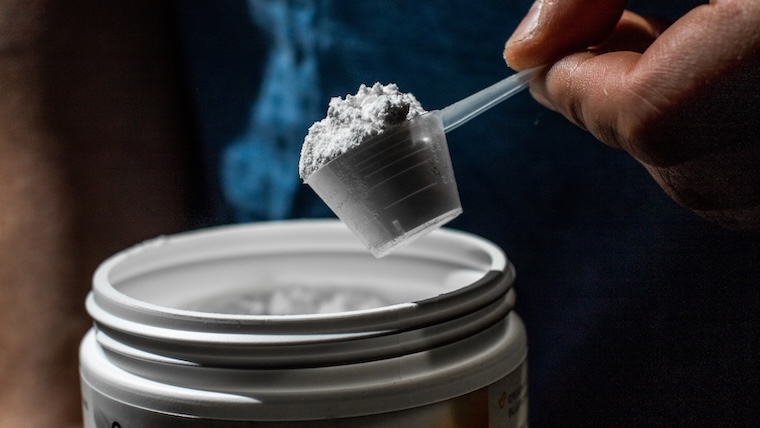Creatine, a natural energy source stored in muscle cells, is key to powering high-intensity exercises and heavy lifting. (1) Research indicates that combining creatine supplementation with resistance training can significantly boost muscle growth, enhance mental performance, and increase cellular energy levels. (2)
As a result, it has become a popular supplement for enhancing workout performance. Beyond its physical benefits, recent studies have begun exploring creatine‘s potential impact on cognitive function.
Could creatine help alleviate depression? On March 26, 2025, Dr. Layne Norton delved into the connection between creatine and depression, examining a study that links creatine to hair loss and explaining why this research may not hold up under scrutiny.
Editor’s note: The content on BarBend is meant to be informative in nature, but it should not be taken as medical advice. The opinions and articles on this site are not intended for use as diagnosis, prevention, and/or treatment of health problems. Talking to your doctor before beginning a new fitness, nutritional, and/or supplement routine is always a good idea.
Cognitive-Behavioral Therapy & Depression
A study conducted in January of 2025 explored the effects of creatine supplementation on individuals with depression undergoing cognitive-behavioral therapy (CBT). (3) Over eight weeks, participants received either a daily dose of five grams of creatine or a placebo alongside their therapy. At the end of the study, they completed a mental health assessment.
The results revealed that the group taking creatine experienced a greater reduction in depressive symptoms compared to the placebo group. This suggests that creatine may offer notable benefits for mood and depression.
Dr. Norton noted that such findings might have been surprising a decade or two ago. However, growing evidence over the past 10 years indicates a strong connection between improving physical and muscular health and enhancing brain health.
We’ve known for 20 years that exercise has cognitive benefits. Only recently have we fully understood how powerful those benefits are.
—Dr. Layne Norton
Dr. Norton referenced a study revealing that eight weeks of resistance training, practiced twice per week for 25 minutes per session, significantly reduced symptoms of major depressive disorder in men. (4) Remarkably, the effect size was greater than that of antidepressants or selective serotonin reuptake inhibitors (SSRIs). However, these approaches are not mutually exclusive.
“If you’re depressed and have been prescribed antidepressants by a professional, I am not saying don’t take those and to just lift weights.” Dr. Norton cautioned. “Lift weights and possibly take those if it’s been prescribed by a professional and you find that it helps your symptoms.”

Dr. Norton is not marketing creatine as a cure for depression or a miracle brain-boosting supplement. He acknowledged that creatine benefits memory, cognitive performance, and mood. When considering creatine’s extensive safety data, proven ergogenic effects (enhancing physical performance and body composition), metabolic advantages, cognitive benefits, and affordability, creatine is a worthwhile supplement.
Creatine & Side Effects
Creatine is widely regarded as a safe and highly effective supplement for improving body composition, strength, and performance. It has minimal downsides for most people, though some may experience mild gastrointestinal discomfort.
According to Dr. Norton, pre-workout supplements containing both creatine and caffeine can sometimes aggravate this issue, as both substances may irritate the gut. To mitigate these symptoms, separating creatine and caffeine intake is often recommended.
Over the past two decades, extensive research has debunked myths surrounding creatine safety, including organ damage concerns. Dr. Norton refuted recent claims linking creatine supplementation to hair loss.
These misconceptions stem from a 2009 study in which rugby players were given creatine for three weeks. (5) The study observed an increase in dihydrotestosterone (DHT), a metabolite of testosterone known to affect hair follicles. Researchers didn’t measure hair loss in this study, and the research had significant methodological flaws.
- Participants who took creatine showed significantly lower levels of DHT, which initially increased with supplementation.
- The placebo group had higher DHT levels at baseline, which later decreased, skewing the results and exaggerating the differences.
- The study was limited in scope, lasting three weeks.
- No subsequent research has replicated these findings.
- Numerous studies report no significant changes in DHT levels from creatine supplementation.
Creatine, low cost, high benefit, no real safety concerns. It’s a no-brainer.
— Dr. Layne Norton
A downside of creatine is the potential for mild gastrointestinal discomfort. Therefore, Dr. Norton advises those with that issue to split the recommended dosage of five grams daily into smaller doses.
More In Research
- Does Ozempic Negatively Affect Muscle Mass?
- How Diet Breaks Impact Metabolism
- The Science of Calf Growth — Are They Different From Other Muscles?
References
- Buford, T. W., Kreider, R. B., Stout, J. R., Greenwood, M., Campbell, B., Spano, M., Ziegenfuss, T., Lopez, H., Landis, J., & Antonio, J. (2007). International Society of Sports Nutrition position stand: creatine supplementation and exercise. Journal of the International Society of Sports Nutrition, 4, 6. https://doi.org/10.1186/1550-2783-4-6
- Kreider, R. B., & Stout, J. R. (2021). Creatine in Health and Disease. Nutrients, 13(2), 447. https://doi.org/10.3390/nu13020447
- Sherpa, N. N., De Giorgi, R., Ostinelli, E. G., Choudhury, A., Dolma, T., & Dorjee, S. (2025). Efficacy and safety profile of oral creatine monohydrate in add-on to cognitive-behavioural therapy in depression: An 8-week pilot, double-blind, randomised, placebo-controlled feasibility and exploratory trial in an under-resourced area. European neuropsychopharmacology : the journal of the European College of Neuropsychopharmacology, 90, 28–35. https://doi.org/10.1016/j.euroneuro.2024.10.004
- O’Sullivan, D., Gordon, B. R., Lyons, M., Meyer, J. D., & Herring, M. P. (2023). Effects of resistance exercise training on depressive symptoms among young adults: A randomized controlled trial. Psychiatry research, 326, 115322. https://doi.org/10.1016/j.psychres.2023.115322
- van der Merwe, J., Brooks, N. E., & Myburgh, K. H. (2009). Three weeks of creatine monohydrate supplementation affects dihydrotestosterone to testosterone ratio in college-aged rugby players. Clinical journal of sport medicine : official journal of the Canadian Academy of Sport Medicine, 19(5), 399–404. https://doi.org/10.1097/JSM.0b013e3181b8b52f
Featured image via Shutterstock/Martyn de Jong